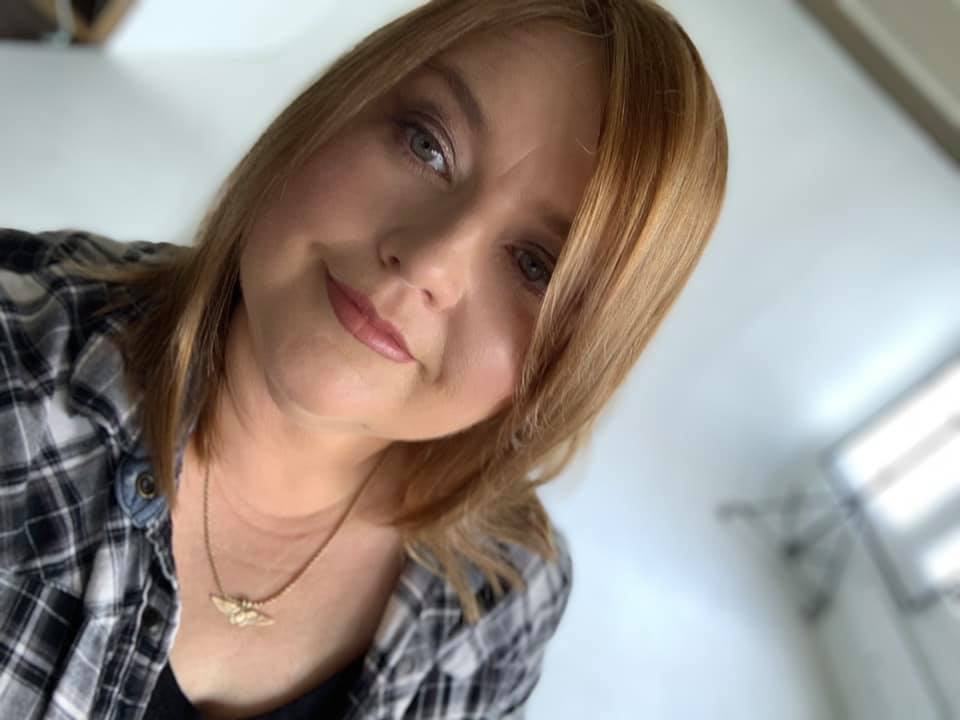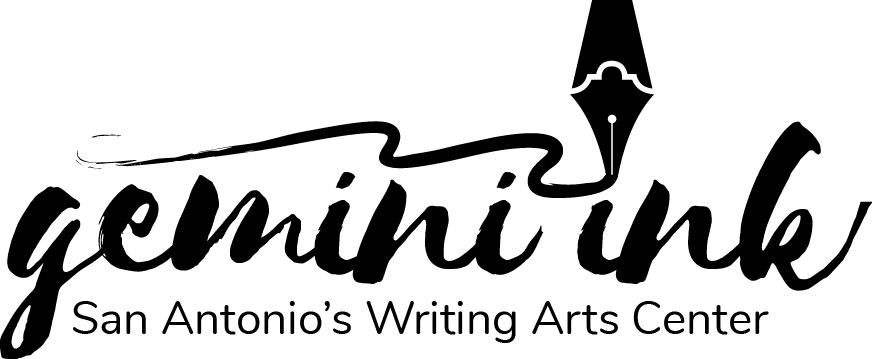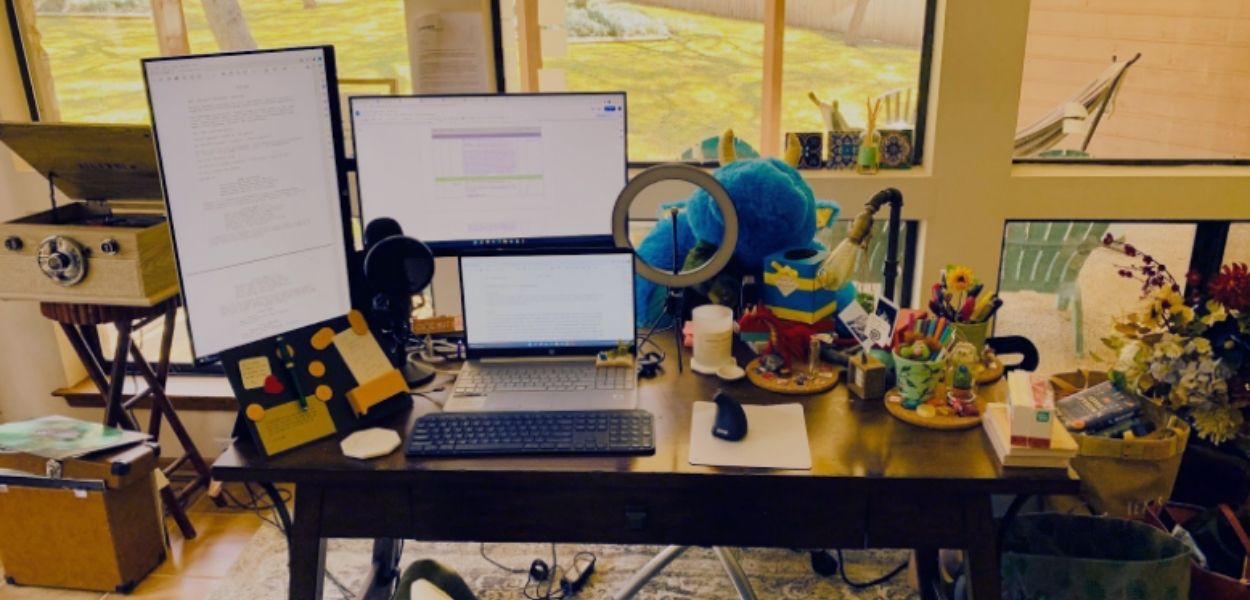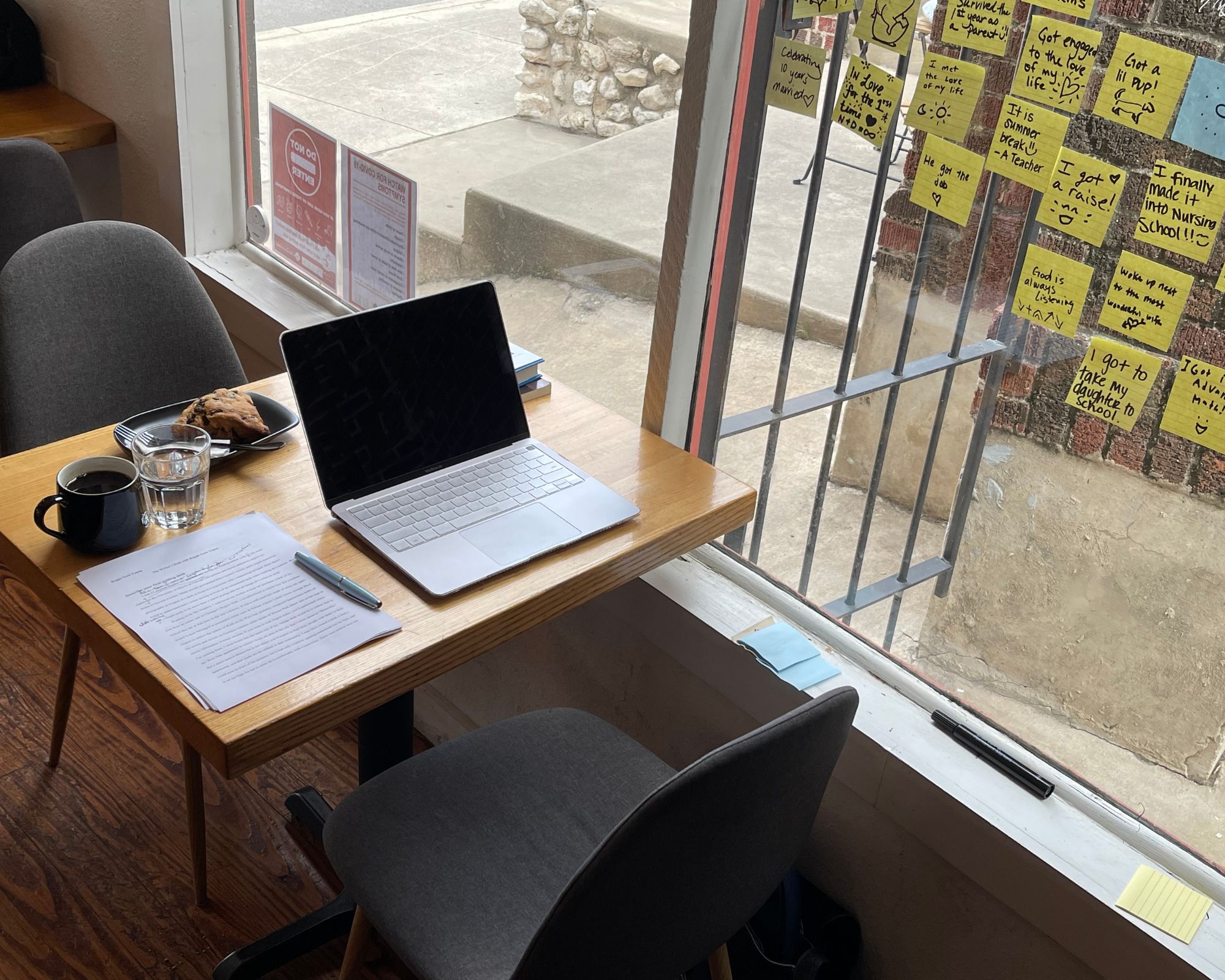The Writer’s Desk features the desks and writing practices of Gemini Ink faculty, visiting authors, teaching artists, volunteers, students, interns, staff, partners and more. Receive new posts in your inbox by subscribing to our newsletter at bit.ly/geminiinknewsletter.
Join Amie Charney on Saturday, April 6, 2022 from 10am-3pm CST, for her workshop: Boost Your Creativity In the Classroom: A workshop for educators of all kinds. In this workshop, we will discover new ways to build creative muscles as teachers which will inspire and nurture creative confidence in students. This workshop includes exercises and writing prompts that boost collaboration and imagination.
Hi Amie, can you describe your first writing desk for us? How is it different (or not) from your current writing desk?
I bought my first writers desk when I turned sixteen. I spent my entire paycheck, that I made as a cashier at Burlington Coat Factory, on a fussy little writing desk that I thought looked straight out of a Jane Austen novel. It could barely fit a laptop and journal, but it had all these great little drawers that I could hide treasures in. After a number of military moves, it was in pretty bad shape, and no longer realistic for the type of writing I do. So, when we moved to San Antonio, I bought a giant, solid wood desk that could handle three computer screens (I don’t know how I ever survived with just one) and all my “inspiration” tchotchkes. I love dragons, so some of the favorite things I have at my desk are a giant blue stuffed dragon that my son gifted me for Valentine’s Day. Her name is Fifinella and she always agrees with my plot choices. I have cloisonne pins that are the covers of some of my favorite books, a handmade box full of “notes to brighten your day” that my children made for me, and lots of my favorite pens. I also bought a record player that I often have on when I write, usually with some Miles Davis spinning. I have giant windows that look out onto my backyard, and live oaks. I love the view, but the windows often become giant surfaces for sticky notes when I’m plotting. A few years ago I found vellum sticky notes that still allow light to come through, so I don’t feel quite as claustrophobic.
Has your preferred place to write changed over the years?
I’m an extrovert, which is kind of rare in a writer. It’s hard for me to work alone in my space at home. So, my preferred workspace is a cafe or public area that has a nice buzz to it. My children call me a serial eavesdropper, but I love to pick up strands of conversations while I people-watch. My favorite place to write in San Antonio is actually the lobby of the Hotel Emma. The large library tables are a great place to tuck into a cup of coffee and pastry and write. When I do have to focus and write at home, I often use an app called Coffitivity. Instead of music, it’s cafe noises from around the world. It’s just the right white noise that I need to not quite feel alone. I am getting better at writing at home. I have a library space now, with these beautiful glass-paned bookshelves that hold my collection. I also have this great tea brand that I love to drink while I write, called Smith Tea. There is a huge benefit to having the kettle just around the corner.
Do you have any habits or routines that you follow before writing?
I wish I had better habits or routines for writing. For years, I’ve been a mother, a teacher, a military wife… and writing has come “catch as catch can”. I’m rarely without my iPad (that has a keyboard), and for years would write in the stands of a gymnastics meet, or poolside during swim lessons. I’d write at friends houses while our kids played, or even in the car waiting for band practice to get over. I learned to just pick up and keep going whenever I could carve out a few minutes. What’s helped me the most is setting a word count goal for the week… not the day. Some days, I could bust out a couple of thousand words, and others a sentence or two. So setting a weekly goal to race towards has helped me. When I started focusing mainly on screenwriting, I tended to set a page goal. I found this formula that gives me a writing minimum to shoot for… A script is roughly 110 pages, so at a minimum, if I write a 1-page a day (or 7 a week), I can have two scripts done in the roughly 260 working days we have a year. For a standard novel, let’s say around 105k words… turns into roughly 400 words a day (2800 per week), and you can have an entire novel written… and a script thrown in for good measure.
What is the one piece of writing advice that you value most?
One piece of writing advice that I value the most comes from Elizabeth George. In her fantastic book on writing called, Write Away (a must-read if you are a plotter), she extols the value of “bum glue”. You can be the most talented wordsmith in the world, but if they lack the bum glue it takes to stick to a chair and work through the toughest spots of a story, they will never succeed. For years, I had a glue bottle with a handmade label “Bum Glue” on my desk, to remind me. I think the other piece of writing advice, which didn’t come from a writer but from the GOAT Wayne Gretzky, “You miss 100% of the shots you don’t take”, keeps reminding me that I need to just keep submitting my work and putting it out there. Eventually, it’ll score.
What theme or symbol often emerges in your work? Why are you drawn to this theme/symbol?
My stories always have a love story embedded into them. I am fascinated with relationships between people, and how we shape one another. That’s a pretty run-of-the-mill theme though. What I am obsessed with though often weaves through my writing… and that is what people do for work. Actually, I often start with my character’s occupations and avocations as a way into their psyche. My current list is: glassblowing, cartography, archeology, linguistics, code breakers, treasure hunters, art thieves, ballet dancers, architects, doctors, fighter pilots, tea makers, wine makers, magicians (think Houdini or Copperfield), inventors, librarians, museum curators… and the list goes on. So when I’m creating a character, that is often where I start because “work” tells us so much about a person and often drives my plots, and gives me a great starting point for natural conflicts and relationships.
What is your motto? Does it also apply to your writing?
I’m not sure it’s a writing motto exactly, but it’s something that I preach to myself and my students… start as close to the end of the story as possible without losing your reader. I think this applies to any medium you are writing in, but especially screenwriting. I think compression is one of the biggest tools we can utilize when telling a riveting story. Most writers have heard start “in media res”… in the middle of the narrative… which is about the same. Although we, as writers, love all the deep and meaningful backstories we give our characters… and fall in love with our words… I always try to keep in mind my audience. I often find myself as a reader skipping over paragraphs, pages… and sometimes even chapters… willing the writer to get back into the story. Those are the parts I try to keep out of my final draft.
Do you like things to be carefully planned out or do you prefer to just go with the flow? Does this also apply to how you lay out a story?
When I started writing, I was a crazy plotter… to the point I’d lose steam when I got to writing the story. A writing mentor suggested that I try just diving in and build the story parachute on the way down… which only got me to about the midpoint and I’d get stuck. So, the longer I write, the more I realize a couple of things. First, it’s great to listen to what works for other writers, we can get some tips and tricks that might work, but ultimately you have to find the magic that works for you. Now, like all writers, I also love telling people what works for me. So, now I have a system of sorts. I love imagination storming in a big, blank sketchbook (one with no lines…. I hate lines). I ask myself questions, I answer them, I write sideways, upside down, slanted. Once I finally start to see some assemblage of story, I try to get it into a “one pager”. Just a paragraph of two that hits at the story, characters, tone. I limit myself to that one page. Then I go nuts. I write as much as I know. I don’t try and make stuff up or fill every hole. I just get as much down as I know. If I can get it into a major beat sheet, that’s great because it gets somewhat of an order. When I get stuck… and here is the key for me… I outline backwards. I often know the end of the story, so it’s easier for me to start with the effect and work the causes backwards. At some point though, I just stop plotting, and write the story. I love writing dialogue, so diving in and hearing my characters is how I get to know them best.
Which words or phrases do you most overuse?
I have a hit list of words and phrases that I overuse. My first round of editing often begins with that list. This is where CTRL F becomes your best friend as you try and root out all your writing ticks. My biggest offender is “starting to”. For some reason, my characters are always “starting to” do something.. “He started towards the door”… “she started to sit down”… instead of just doing it. I also find that my characters chuckle and wink… a lot, so those are on my hit list as well. When I’m writing a script, I am highly attuned to the length of lines. My maximum line length for dialogue is four physical lines (not four sentences… four lines), and I try to keep any scene descriptions to that general rule as well. If I start to encroach on real estate longer than that, I tweeze out as much as I can.
What are some misconceptions about being a writer that you can discredit?
I’m an extrovert, so I talk to people all the time.. On planes, trains, in the jury pool room… and when people hear that I’m a writer, they usually tend to say they wanted to be one once… or someday they want to write a book… or they have a story they have been dying to tell. And, I believe them. I think writing looks easy on the surface because it is a primary source of communication that most humans use. There is a difference however between “writing” and “creating”. It’s the “creating” part that gets sticky. How do you take a blank sheet and build a world on it? I think that anyone… given enough time, motivation… bum glue… can write and get published. I do think you can teach someone to become a better writer if they are willing to take those lessons and practice. Now, is there some special magic that sets writers apart? Absolutely… and sometimes breathlessly. The challenge is combining that awe-inspiring world-building and word craft with work ethic.

Amie Charney is a screenwriter who lives in San Antonio, Texas. She has a BA in Literature from California State University and an MFA in Creative Writing from the University of California Riverside Palm Desert. She is also the current Director of Creative Writing for the Northeast School of the Arts. Her work can be found in literary journals such as Southern Missouri Press Journal, Proud to Be, As You Were, Oh! Cat!, High Country Magazine, and others. Amie is the inaugural recipient of the Harlequin Creator Fund for Television Writing and is currently developing a new television show with eOne and Harlequin. She’s the wife of a pilot, mother of two fantastic young adults (both Aggies), and a proud Marine Corps wife! She was recently featured in Script Magazine and the Harlequin Creator Space, as well as San Antonio Magazine.
Connect with Amie:
Twitter: @amiecharney
Facebook: facebook.com/amiecharneywriter
Instagram: @amiecharney
Website: www.amiecharney.com



